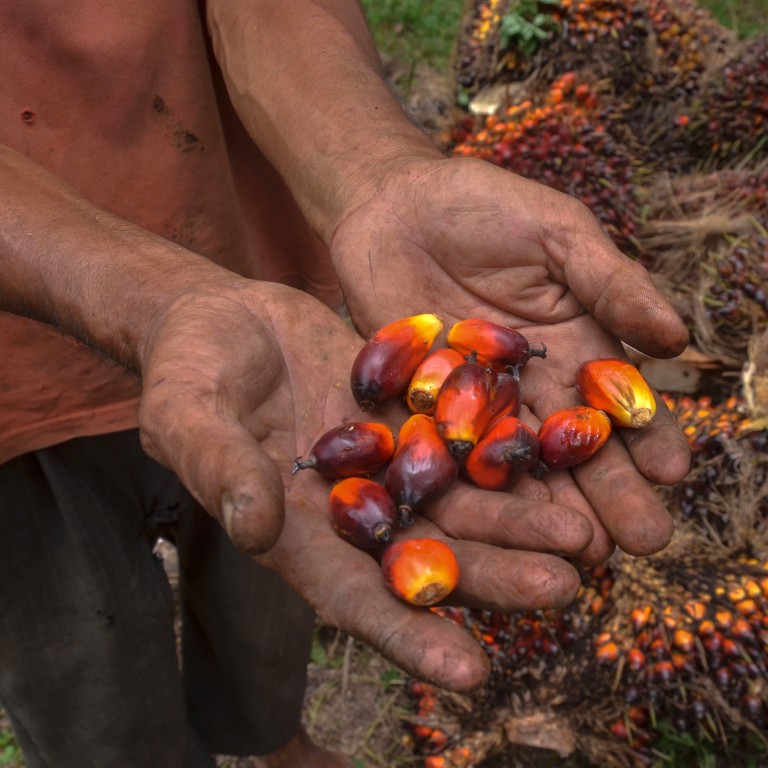
I’ll buy planes from China? Maybe not, says Malaysia’s Mahathir Mohamad – but EU should still rethink its war on palm oil
- The Malaysian prime minister says the European Union’s planned ban on palm oil will provoke a backlash – even if it’s not the one he originally claimed
- Malaysia and Indonesia are teaming up to oppose an EU plan to phase out palm oil in biofuels by 2030
“We have to make known the problems we face when [European countries] take actions against us,” he told reporters at the 2019 Langkawi International Maritime and Aerospace Exhibition on Tuesday. “What I was doing was telling the world that it is grossly unfair for rich countries to prevent poor countries from getting richer by not buying their products. That was all.”
Malaysia ‘values China’: Mahathir signs up to Xi’s second belt and road summit
“If [the EU] keeps on taking action against us through our palm oil products and tries to impoverish us, we will have to think of buying aeroplanes from China or others. Chinese technology may be even more advanced than that of Europe,” he had said at the time, adding Malaysia did not need sophisticated jets as it was not a warlike nation.

Although he has since walked back that statement, saying it was “only a suggestion” and that Malaysia may not buy any jets at all, the Southeast Asian leader maintains the EU’s planned regulations are unfair and would see a backlash across the region.
Malaysia and Indonesia – the world’s two largest palm oil producers, accounting for 80 per cent of the global supply – have resolved to team up to contest the EU’s Renewable Energy Directive II (RED II), with Mahathir and Indonesian President Joko Widodo saying last year they were “facing the same problem”.
Malaysia and Indonesia threaten goods boycott over EU palm oil crackdown
The Indonesian Trade Ministry’s international trade director-general told the Indonesian press that the two nations would make separate moves against the palm oil policy, which may see the EU phase out palm oil use in biofuels by 2030.
“We will wait for our partner, Malaysia, as to which law firm will be assigned. We have to complement each other,” Oke Nurwan told The Jakarta Post, adding that Indonesia was prepared to appeal to the World Trade Organisation if necessary.

Meanwhile, Malaysia’s Primary Industries Minister Teresa Kok will be travelling in Europe this May in a last-ditch attempt to defend the local industry, although she has raised the possibility of looking to Middle Eastern and African markets instead.
Political economist and supply chain consultant Khor Yu Leng said that Malaysia had to “get loud” to be heard on the matter.
I’d side with rich China over fickle US: Malaysia’s Mahathir Mohamad
“However, it remains to be seen how united these countries can stand. The draft regulation contains certain exemptions for independent smallholders and producers with intensified yields,” she said, explaining that both Indonesia and Colombia had sizeable producers that fell under these exceptions.
“The regulations dissect the market, and there has always been a lot of competition to export. Colombia sounds more conciliatory to the policy than Malaysia and Indonesia, which makes sense as if they fall under the exemptions then they have a leg up.”
Indonesia wants its palm oil companies to sue if EU goes ahead with curbs
Indonesia, too, has a high number of smallholder farmers and so could also fall under the RED II exemptions.
“Each country is slightly different so the question is whether they can be united beyond just talk. Indonesia and Colombia can together produce maybe nine million tonnes, which is more than twice what the EU needs in terms of biofuels.”
The EU market was Malaysia’s second largest palm oil export market last year, taking in 1.91 million tonnes of palm oil and making up 12 per cent of the country’s total palm oil exports.

